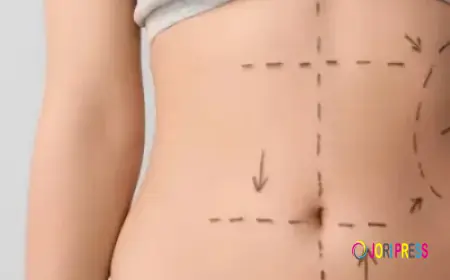Are Tummy Tucks Allowed in Islam? A Faith-Based Perspective
Wondering if tummy tucks are allowed in Islam? This guide explores Islamic views on cosmetic surgery, intention, and body modification.
As cosmetic procedures become increasingly common around the world, many Muslims considering body-enhancing surgeries like abdominoplasty ask an important question: Are tummy tucks allowed in Islam?
Islamic rulings on cosmetic surgery are nuanced and rooted in core principles of intention (niyyah), necessity (darura), and avoiding harm (la darar wa la dirar). This article explores tummy tucks through an Islamic lens to help Muslim men and women make informed, spiritually conscious decisions.
Understanding Tummy Tucks: What Is It?
A tummy tuck, or abdominoplasty, is a surgical procedure that removes excess skin and fat from the abdomen and tightens the abdominal muscles. It is often performed for:
-
Women after multiple pregnancies
-
Men and women after major weight loss
-
Individuals with weak or separated abdominal muscles
-
Improving posture or relieving back pain in some cases
While it may seem cosmetic at first glance, tummy tucks can offer functional and emotional benefits, which is a key consideration in Islamic discussion.
Islam and Cosmetic Surgery: The General Principle
In general, Islam encourages believers to maintain the body Allah has given them, treating it with care and avoiding unnecessary alteration.
However, Islamic scholars have not issued a blanket prohibition on all forms of cosmetic surgery. Instead, rulings depend on the intention behind the procedure and whether it leads to harm or deceit.
According to many scholars, cosmetic surgery is permissible under the following conditions:
✅ 1. Medical or Functional Need
If the surgery helps restore normal body function or addresses a physical problem (like post-burn reconstruction or severe abdominal wall weakness), it is generally allowed.
✅ 2. Psychological or Emotional Distress
If the procedure significantly improves mental well-being and confidence, and no deception or excessive risk is involved, many scholars view it as permissible.
✅ 3. No Imitation or Deception
Islam prohibits altering the body to imitate others or deceive, especially if the change is driven purely by vanity or the desire to look like celebrities or non-Muslim ideals.
✅ 4. No Major Harm
If the surgery has more benefits than harms, and does not endanger one’s life or health, it may be considered halal or at least mubah (permissible).
What Do Scholars Say About Tummy Tucks?
Islamic rulings from respected scholars and organizations highlight the importance of intention and necessity:
? Sheikh Yusuf al-Qaradawi
One of the most renowned modern scholars, al-Qaradawi stated that surgeries aiming to correct defects or restore the body to a normal state are permissible. If a tummy tuck is performed to correct deformity or excess sagging skin, it may fall under this ruling.
? The Islamic Fiqh Council
This body ruled that plastic surgery is permissible if it removes a physical defect or treats a psychological issue that causes genuine suffering.
When Is a Tummy Tuck Halal?
A tummy tuck may be considered halal if the following apply:
-
It's done to remove loose skin after pregnancy or weight loss (not just for luxury or imitation)
-
It improves your quality of life or physical comfort
-
It does not involve deception, such as hiding your true appearance in marriage
-
You are not changing the way Allah created you without valid reason
-
The procedure is safe and done with professional medical supervision
When Is a Tummy Tuck Not Allowed?
A tummy tuck may be haram (prohibited) or discouraged in Islam if:
-
The goal is to imitate celebrities or purely enhance beauty for vanity
-
It risks your health or causes harm
-
It involves showing your private parts (awrah) unnecessarily
-
The surgeon is not of the same gender, when a same-gender option is available
-
It involves excessive spending that leads to debt or extravagance
Key Islamic Concepts to Consider
Before making a decision, consider these essential concepts in Islamic ethics:
✨ Niyyah (Intention)
Why are you getting the surgery? If your intention is to restore health or well-being, the action is judged accordingly.
✨ Darura (Necessity)
If the tummy tuck is medically needed (e.g., for hernia correction or mobility issues), it becomes more permissible.
✨ Fitrah (Natural Creation)
Islam values maintaining your natural body, but correcting damage, defects, or abnormalities is not considered altering creation unjustly.
Practical Guidelines for Muslim Patients
If you're a practicing Muslim considering a tummy tuck, here are steps to ensure your choice aligns with your faith:
✅ 1. Seek Knowledgeable Medical Advice
Get a consultation from a certified plastic surgeon in Dubai to understand if the procedure is medically justified.
✅ 2. Consult a Trusted Scholar
Discuss your specific situation with a scholar or imam who understands both Shariah and modern health issues.
✅ 3. Choose a Same-Gender Surgeon
When possible, opt for a female surgeon for women or male surgeon for men, especially for intimate procedures.
✅ 4. Maintain Modesty During Surgery
Ensure that the clinic respects Islamic boundaries regarding privacy and covering of awrah.
✅ 5. Avoid Debt or Wastefulness
Islam discourages overspending or falling into debt for cosmetic reasons. Choose a package that fits your financial situation.
FAQs: Tummy Tucks and Islam
Q1: Is it haram to get a tummy tuck just to look better?
If your sole intention is vanity or imitation, many scholars discourage it. If it helps with mental health or physical comfort, it may be permissible.
Q2: What if I feel depressed due to my body after childbirth?
Mental and emotional health is important in Islam. If a tummy tuck relieves distress and restores confidence, many scholars permit it.
Q3: Do I need to tell my future spouse I had a tummy tuck?
Transparency is encouraged in Islam, especially regarding physical features. If results are drastic, it’s best to be honest.
Q4: What about combining a tummy tuck with liposuction?
If both are done for a valid reason and under safe conditions, the same rulings apply.
Q5: Is it allowed to show my body to a surgeon?
Yes, when necessary for treatment and no same-gender doctor is available. But efforts should be made to maintain modesty.
Final Thought: It’s About Intention and Balance
So, are tummy tucks allowed in Islam? The answer lies in your intention, your personal needs, and your respect for the principles of modesty, safety, and sincerity. Islam does not forbid looking after your body, but it emphasizes balance—between outer beauty and inner values.
If you're seeking a clinic that respects both medical excellence and cultural sensitivity, Tajmeels Clinic in Dubai is known for offering professional, discreet care—tailored to Muslim patients. With experienced surgeons and privacy-conscious facilities, it’s a trusted place for procedures like tummy tucks performed in line with Islamic values.
What's Your Reaction?
 Like
0
Like
0
 Dislike
0
Dislike
0
 Love
0
Love
0
 Funny
0
Funny
0
 Angry
0
Angry
0
 Sad
0
Sad
0
 Wow
0
Wow
0


















































